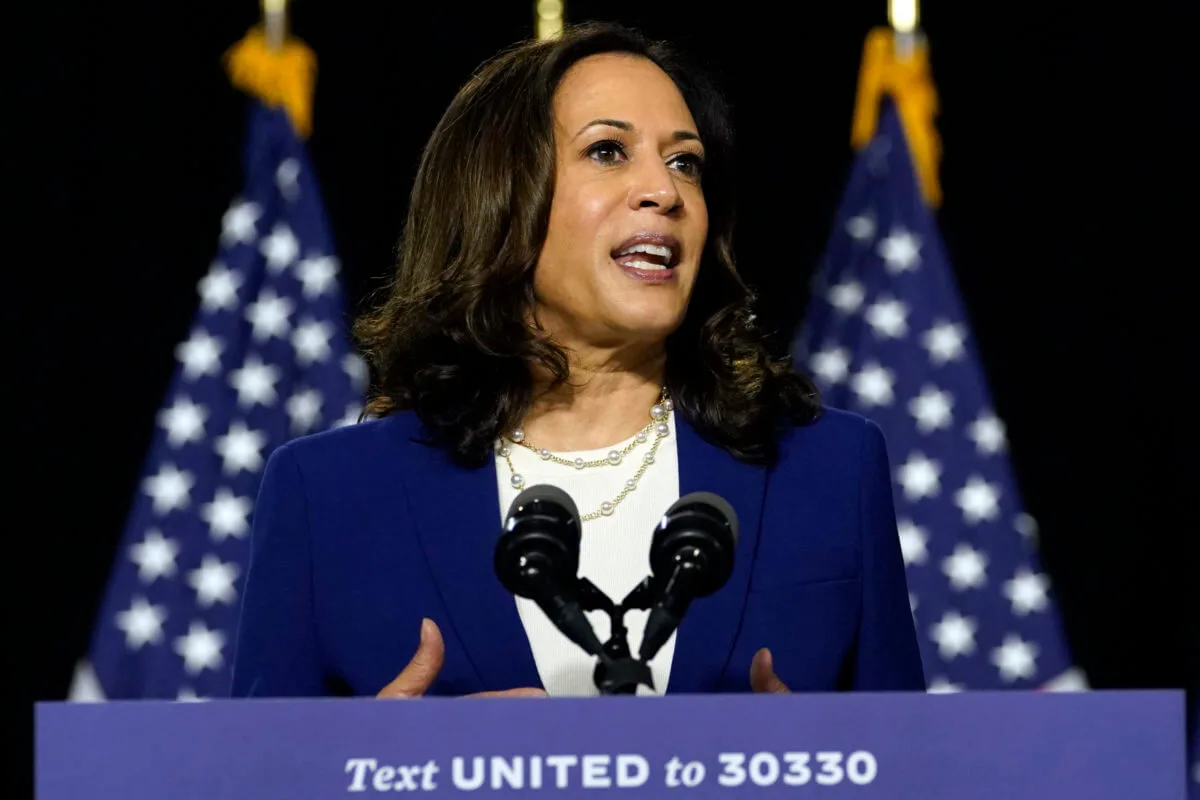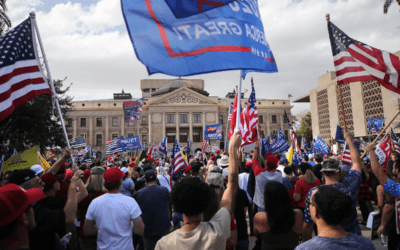
(AP Photo/Carolyn Kaster)
As San Francisco’s district attorney, Harris started the city’s first environmental justice unit fifteen years ago.
As California suffered through one of its worst wildfire seasons on record and the Gulf coast dealt with flooding, power outages, and evacuations from Category 4 Hurricane Laura, the GOP held its national convention and ignored the issue of climate change and what to do about it.
That didn’t come as a surprise. President Donald Trump released his agenda for a second term, which was 50 vague bullet points that didn’t mention the climate once. Vice President Mike Pence also skipped the topic in his GOP convention speech, which he delivered on the night that Hurricane Laura began to hit the United States. That marks a stark contrast to the Democratic National Convention the previous week, where climate issues—from jobs to the Paris Climate Accords—were featured heavily.
Climate change is an increasingly important topic for voters, according to a Pew Research Center poll from April. Sixty percent of Americans say that global climate change is a threat to the United States, up from just 40% of Americans in 2009. Harris and Biden have expressed their own concerns over climate change and made addressing it a priority in their campaign. Harris also has a track record of fighting against climate change and working towards environmental justice throughout her career.
As a district attorney in San Francisco, Harris created the office’s first environmental justice unit in 2005. Environmental justice is a movement that focuses on ensuring there is an equitable distribution of environmental burdens and benefits, regardless of race, income or gender. Minority communities have often borne the brunt of policy decisions that expose their homes and neighborhoods to more pollution, heat, and toxic chemicals.
The environmental justice unit was staffed with two attorneys and an investigator, and was designed to address environmental crimes that typically affected the community’s poorest individuals. It tackled issues like toxic materials getting dumped in local water sources.
“Crimes against the environment are crimes against communities, people who are often poor and disenfranchised,” Harris told SFGate back in 2005. “The people who live in those communities often have no other choice but to live there.”
As California’s attorney general, Harris sued Southern California Gas Co. for a massive underground methane explosion outside of Los Angeles in 2016. One scientific analysis found that, at the time, it was the largest methane explosion in United States history and released the equivalent of the yearly emissions of 500,000 cars. More than 11,000 residents were evacuated and the state’s governor declared a state of emergency in the area.
“The impact of this unprecedented gas leak is devastating to families in our state, our environment, and our efforts to combat global warming. Southern California Gas Company must be held accountable,” said Harris in a statement after the explosion.
Southern California Gas Co. agreed to pay state and local governments nearly $120 million to settle the case in 2018, after Harris had been elected to the Senate.
Harris took on Chevron by opposing a refinery expansion in Richmond, California. The community surrounding the proposed expansion was majority Black and Hispanic, and had already waged a long battle over pollution at the site.
Harris also won cases against ConocoPhillips and BP over improperly maintained fuel storage tanks that contributed to oil spills. And she was part of the state’s settlement with Volkswagen after the company cheated emissions standards.
Harris continued her work on environmental issues when she was elected to the U.S. Senate in 2017. There she opposed Trump administration rollbacks on environmental protections, like offshore drilling and automotive fuel standards. She introduced the Climate Equity Act with Rep. Alexandria Ocasio-Cortez (D-N.Y.), which would require the federal government to closely review how environmental rules affect “frontline” communities, which are often composed of minority communities. Harris also backed the Green New Deal plan proposed by Ocasio-Cortez.
The Biden-Harris ticket includes a $2 trillion plan to tackle climate change, with a real emphasis on creating an economy that promotes sustainable jobs and infrastructure. It also aims for net-zero emissions from power plants by 2035, which is the most ambitious climate plan offered by a candidate from any major party, according to The Washington Post.
“I know meeting the challenge [of climate change] would be a once-in-a-lifetime opportunity to jolt new life into our economy, strengthen our global leadership, protect our planet for future generations,” Biden said when he introduced his climate plan in July. “If I have the honor of being elected president, we’re not just going to tinker around the edges. We’re going to make historic investments that will seize the opportunity, meet this moment in history.”

He said what? 10 things to know about RFK Jr.
The Kennedy family has long been considered “Democratic royalty.” But Robert F. Kennedy, Jr.—son of Robert F. Kennedy, who was assassinated while...

Here’s everything you need to know about this month’s Mercury retrograde
Does everything in your life feel a little more chaotic than usual? Or do you feel like misunderstandings are cropping up more frequently than they...

Arizona expects to be back at the center of election attacks. Its officials are going on offense
Republican Richer and Democrat Fontes are taking more aggressive steps than ever to rebuild trust with voters, knock down disinformation, and...

George Santos’ former treasurer running attack ads in Arizona with Dem-sounding PAC name
An unregistered, Republican-run political action committee from Texas with a deceptively Democratic name and ties to disgraced US Rep. George Santos...




